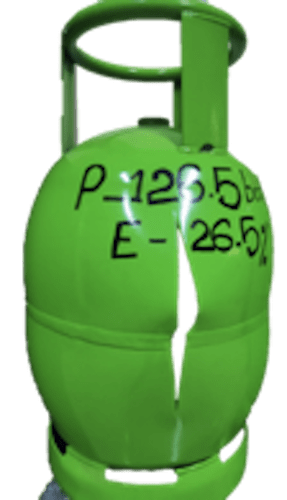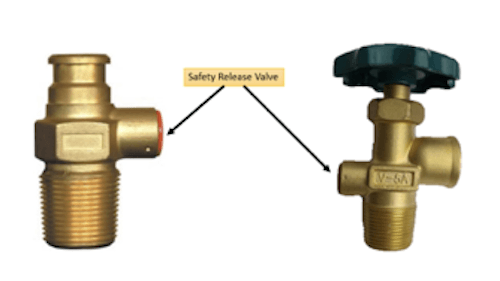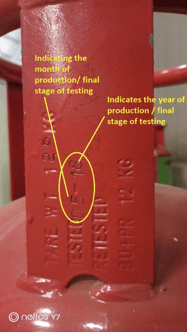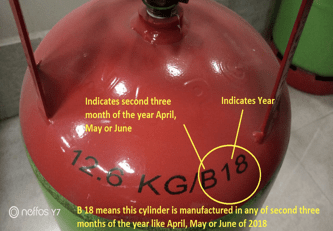I have seen lots of people think that LPG cylinders can blast anytime. But actually, it’s hardly possible to blast the LPG cylinder.
Let me show you why step by step –
High blasting pressure of cylinder:
Normally 1 cylinder out of each 200 cylinders is subjected to ultimate pressure to see at which pressure it will fail.

In the picture, a cylinder has failed at 126.5 bar with an elongation of 26.5%.
LPG in the cylinder is kept at 7 to 8 bars.
The working pressure of the LPG cylinder is about 17 bar. By doing a little math we can say that LPG cylinder bursting pressure is almost 7 times higher than the working pressure.
Safety relief valve induced cylinder valve:
In every safety valve, there is a safety device that will release LPG when pressure will exceed 26 bar. That means if the cylinder will be subjected to fire or any kind of heating source by which pressure can be increased then if the pressure goes above 26bar then this safety valve will open up and reduce the gas pressure which will prevent it from exploding. Even the large tanks and bullets also have larger versions of safety relief valves

How to recognize good cylinder:
We know that every cylinder has an expiry date. Normally when a new cylinder is produced it can be used for at least 5 years. And every cylinder has its manufacturing date embossed and printed on it.
There is a misconception among people that the given date given on the cylinder is an expiry date.


Pic: Indications on a cylinder that shows the manufacturing date or date of final testing of the cylinder. Notice on the picture of the left. There is an option called RETESTED. A date will be embossed here when the cylinder will return from the market for any repair work. Thus, after every repair quality of the cylinder is maintained.
While buying any LPG cylinder we should try to buy newer cylinders and checking these manufacturing dates so that we can determine the expire date. It is better to not use a cylinder for older than five years.
Testing Procedures while manufacturing:
While manufacturing, a cylinder has to go through many tests. Engineers and quality inspectors use different checking methods using higher pressure like 34 bar to 100 bar.
Even there is a facility to do X-Ray the welding area so that any defects can be seen easily.
There are almost zero percent probabilities to produce a leaked of defect cylinder if any company or industry follows international standards like DOT 4BA, ISO, etc.
Then how cylinder blast:
- BLEVE
- Local Semi-standard cylinders
- Leakage
BLEVE:
Boiling Liquid Expanding Vapor Explosion is abbreviated as BLEVE. It is occurred by the failure of any closed vessel while the temperature of the inner pressurized liquid is above its boiling point. It can happen even without fire but for that, you have to penetrate almost 2.5mm or more thick MS plate. So, it is nearly impossible.
Local Semi Standard Cylinders:
Some unauthorized people and workshops are trying to make or reproduce a 12 kg cylinder. They sometimes buy rejected cylinders and repair it though it goes against the standard. So, try to buy always a well-known brand’s cylinder even if costs you a little bit higher than the local semi-standard ones.
Leakage:
In most cases, LPG blasts are occurred due to having gas in a confined place. LPG is heavier than air when there is a leakage it goes directly just on the floor or in the basements. Then with a slight ignition explosion can happen. To prevent this use of soap water on pipe joints whenever you are setting a new cylinder. Change old and hard pipes. And be careful if you find the smell of rotten eggs or cabbages in your house cause leaked LP gas smells like that.
Some misconceptions:
1. Does the shaking cylinder explode it?
Ans: NO
2. Every newspaper report that gas cylinder explodes, is it true?
Ans: NO. In most of the cases, the house explodes due to leakage of gas.
3. Is it safe to keep an LPG cylinder in sun?
Ans: No.
4. Is an empty gas cylinder dangerous?
Ans: Yes, it is. A gas cylinder is never empty unless it is emptied by expert people.
Conclusion:
If you have a sense of how to be careful about buying and using an LPG cylinder to avoid explosion then it would be great.
Always check the manufacturing date. Don’t buy cylinders older than 5 years. Don’t use the local semis standard cylinder. Do soap water tests regularly and be careful if you find the smell of rotten eggs r cabbage in your house.
Let me know what you think in the comment section. Good Bye!
